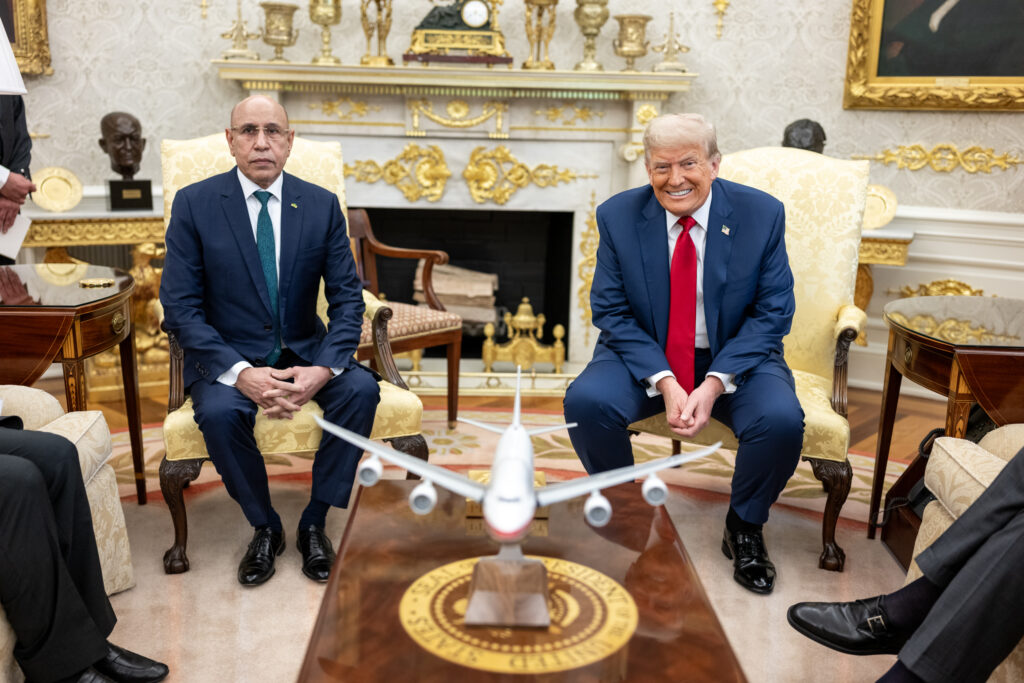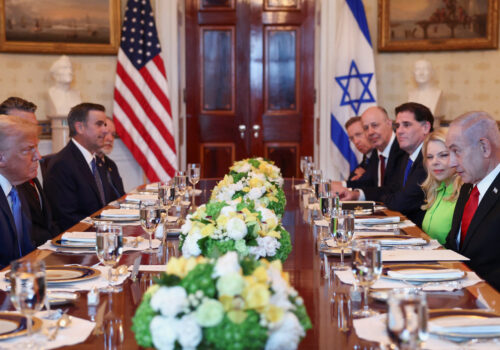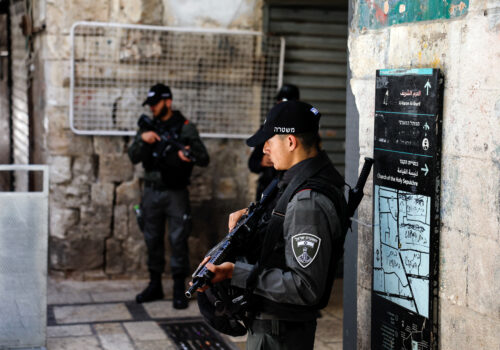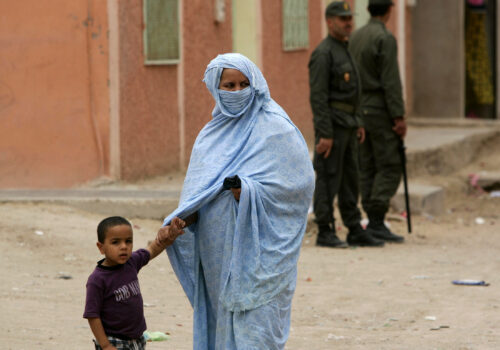Mauritanian President Mohamed Ould Ghazouani recently met with Israeli Prime Minister Benjamin Netanyahu on the sidelines of the US-Africa Summit, according to media reports, which I confirmed through sources on background. The meeting reportedly discussed resuming diplomatic relations between the two countries and potentially joining the Abraham Accords.
Such an agreement would not only inject a breath of fresh air into the stalled normalization process since October 7, 2023—but also confer geostrategic superiority for the United States in the Sahel by forming a new bloc of US allies alongside Morocco and the UAE, capable of countering the growing Chinese-Iranian-Russian economic and political expansion in the region.
According to the same source, citing a “person familiar with the plans,” it was US President Donald Trump who facilitated the meeting between Netanyahu and Ghazouni, as the Mauritanian ambassador to the United States, Cissé Mint Cheikh Ould Boïde, denied arranging the meeting on her end.
This appears to build upon a foundation set by Trump’s first administration, which, in 2021, was led by then-senior White House adviser Jared Kushner and then-special envoy Avi Berkowitz. They had identified Nouakchott, along with Jakarta, as the closest Muslim-majority countries to join the Accords. Officials, at the time, had stated that Mauritania was “weeks away” from signing a deal.
Early indications of a return to negotiations
Indications of Mauritania—a member of the Arab League—warming up to the Abraham Accords began when its foreign ministry described the United Arab Emirates’ (UAE) 2020 signing of the landmark agreement establishing regional relations with Israel as a sign of “wisdom and good judgment.” The ministry added that “the UAE possesses absolute sovereignty and complete independence in conducting its relations and assessing the positions it takes in accordance with its national interest and the interests of Arabs.”
Like many Arab countries, Mauritania became reluctant to go ahead with the imminent normalization deal with Israel due to public perception amid the 2023 Gaza War, as thousands of citizens regularly took to the streets, condemning the humanitarian toll of the Israeli Defense Forces’ military operations in the Strip.
SIGN UP FOR THIS WEEK IN THE MIDEAST NEWSLETTER
Ould Ghazouani has always been sensitive to the pulse of the streets of the North African country, given his sensitive position in a country prone to violent extremism and a series of political upheavals, starting with the 2005 military coup by the Military Council for Justice and Democracy that ousted former President Maaouya Ould Sid’Ahmed Taya. Taya was among the few Arab leaders who had recognized the state of Israel and established full diplomatic representation back in 1999, with the hope of reinforcing economic and anti-terrorism cooperation with the United States and repositioning his country as a key Western ally in North Africa and the Sahel.
Under Taya’s predecessors, Mauritania initially maintained ties with Israel, but eventually had to give in to the popular pressure amidst the 2008 Gaza War and freeze all relations in January 2009 before entirely severing connections in March 2010.
A Mauritania-Morocco-UAE axis is forming
When and if Mauritania joins the Abraham Accords clan, it will not be a mere reestablishment of ties with Israel, but will unequivocally align with a new forming bloc in the Sahel, which aims at countering Iranian, Russian, and Chinese ambitions there, and reinforce US geostrategic presence in the region through a trusted Mauritania-Morocco-UAE trilateral alliance.
According to my Moroccan sources, this alliance began to take shape when Mauritania’s first lady, Mariem Bint Dah, landed in Casablanca with her spouse to undergo emergency surgery in the kingdom in December 2024. This private visit provided Ould Ghazouani with the opportunity to meet King Mohammed VI and open a new chapter in bilateral relations, which was later described by Mauritania’s Minister of Foreign Affairs, Mohamed Salem Ould Merzoug, as “going through their best period.”
A series of subsequent steps cemented this regained trust between the two neighbors. Soon after the 2024 visit, Mauritania and Morocco signed multiple strategic agreements in the fields of electricity, internet connectivity, infrastructure, and renewable energies. Then in February, the two neighbors opened a new border crossing through the disputed Western Saharan territories, with a 93-kilometer road connecting Smara to the Mauritanian border via Amgala and Tifariti—further enraging the Polisario Front and its patrons in Algiers. Then, in April, negotiations to update their thirty-eight-year trade agreement were launched. The commercial framework aims to boost bilateral trade to $350 million by the end of 2025. An industrial deal was also recently announced, capitalizing on Mauritania’s significant iron reserves.
These movements appear to confirm that Nouakchott is ending its four-decade-long “positive neutrality” between Morocco and Algeria regarding Western Sahara, which it had carefully observed after recognizing the Sahrawi Republic in 1984, and is shifting steadily towards support for Rabat starting in 2024. As confirmed by declassified Central Intelligence Agency wires, Mauritania had long feared that once Morocco recovers the disputed territories of Western Sahara—lost in colonial border disputes—it would soon turn to demanding sovereignty over parts of Mauritania, established by France in 1904 as a separate protectorate, due to their intertwined histories.
This new dynamism was ushered in by the two leaders’ common friend, the UAE’s Mohamed Bin Zayed Al Nahyan (MBZ)—the third pillar of this new alliance. The presence of both Mohammed VI and Ould Ghazouani in Abu Dhabi at the same time sparked speculations about the launch of a new Atlantic corridor between the coast and Sahel countries, announced by Morocco and partially financed by the UAE, which has shown growing ambitions in the African continent. The Atlantic Initiative is meant to link economically landlocked Sahel countries to the ocean through Mauritania and Western Sahara. The UAE soon confirmed the rumors by joining the $25 billion Nigeria-Morocco Gas Pipeline Project, the world’s longest offshore pipeline, which will benefit both Mauritania and Morocco, connecting West Africa to Europe.
Diplomatic sources, whom I spoke with from both Morocco and Mauritania, signaled that a fourth guest might have been present at the meetings in Abu Dhabi: Israel. These meetings could have served as a preparation for the Netanyahu and Ould Ghazouani meeting in Washington this week. The UAE is no stranger to such secret talks between Israel and other Muslim-majority countries. Mauritanian officials, themselves, reportedly met with an Israeli envoy in the calm corridors of Emirati palaces in 2023 to reactivate normalization talks.
What’s at stake for the United States and Mauritania
Mauritania is the missing piece of the puzzle to unlocking the Sahel for the United States, Israel, and European allies. The region has been experiencing seismic shifts in the past few years, with anti-colonial and anti-Western regime changes in Mali, Niger, and Burkina Faso, and a retreat of French and US forces in favor of new Russian, Iranian, and Chinese actors.
The US strategy so far has been to stabilize this critical region at the doors of the Mediterranean and Europe by supporting classical allies like Morocco and attempting to incentivize other reluctant ones to join the Abraham Accords as its newest framework for the Middle East and North Africa to counter violent extremism and build a prosperous and economically integrated region. In its North African chapter, the Accords needs new allies like Mauritania and others with existing diplomatic relations with Israel and alignment with the Moroccan Atlantic Initiative, like Senegal, to counter an increasingly isolated and anxious Algerian regime, which openly sides with Iran, or the new lords of the land in the Sahel who are more ideologically-sympathetic with Russia and China.
Mauritania, however, due to its sensitive situation regarding the Western Sahara dispute—being a party to the conflict until 1979—and its problematic borders with President Assimi Goïta’s Mali and President Abdelmadjid Tebboune’s Algeria, requires guarantees to engage in such a project. An alliance with Morocco and the UAE, in this case, aims to reassure Nouakchott with both military support and financial backing. MBZ had already injected two billion dollars into the city of Chinguetti (about 20 percent of the country’s GDP), which helped in the acquisition of MALE BZK-005 Chang Ying drones to secure its borders, resulting in the closing of its borders with Algeria in Lebriga back in May and several interceptions of Polisario Front illicit activities.
With its northern neighbor, things are more complex. It seems, however, that current threats from Iran and Algeria, as well as economic interests, are overshadowing historical qualms, as evidenced by the increased economic and military cooperation between the two countries in recent years. Rabat today desperately needs Nouakchott’s adherence to its Atlantic Initiative and is inviting it into the exclusive Abraham Accords club and providing guarantees and training against border tensions with Algeria.
If the rumors are true and Mauritania is nearing a historic deal with Israel, this could mark the beginning of a re-engagement, not only with Nouakchott but also with Sahel countries that have previously severed ties with Israel, such as Mali and Niger. This could also be a moment of realignment for Israel with new countries, such as Burkina Faso, with the help of Moroccan–UAE mediation, as the two Abrahamic countries both enjoy high credibility and access in the Sahel. This would also provide a strategic foothold for the United States in the area, enabling Washington to monitor any malign influence by third parties and promote greater stability and prosperity for the soft underbelly of its European allies.
Sarah Zaaimi is a resident senior fellow for North Africa at the Atlantic Council’s Middle East programs, focusing on identity and minorities in the region. She is also the center’s deputy director for media and communications.
Further reading
Sat, Jul 12, 2025
Netanyahu’s trip to Washington ends with conflicting signals
MENASource By Daniel B. Shapiro
The moment of truth may yet come when Trump’s leverage on Netanyahu, which is considerable, may not be expressed only in private settings.
Wed, Jun 18, 2025
Dispatch from Jerusalem: Inside Israel’s bunkers as Iran war erupts
MENASource By Sarah Zaaimi
The stakes are higher as two opposing rhetorics about the region's future are at play: Pan-Abrahamism and Revolutionary Islamism.
Wed, Apr 9, 2025
Why it’s time to terminate the UN’s dysfunctional mission in Western Sahara
MENASource By Sarah Zaaimi
Only way out of fifty-year colonial impasse may be outside the United Nations and its legacy of failure for the Sahraoui people.
Image: July 9 2025, Washington, District of Columbia, USA: President Donald Trump greets President Mohamed Ould Cheikh El Ghazouani of Mauritania in the Oval Office, Wednesday, July 9, 2025, before a multilateral luncheon with African leaders. (Credit Image: ? Daniel Torok/White House/ZUMA Press Wire)




